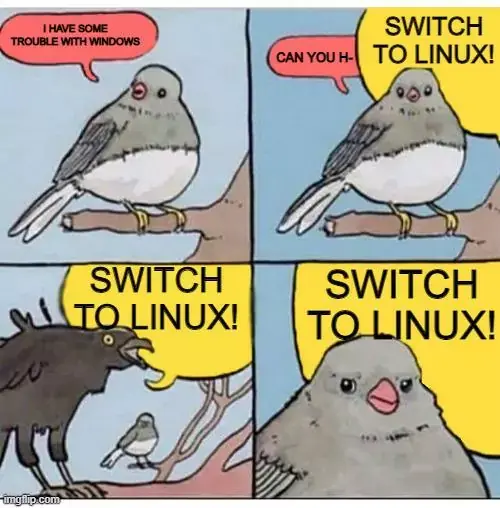this post was submitted on 05 Jul 2023
2955 points (97.2% liked)
linuxmemes
27375 readers
1442 users here now
Hint: :q!
Sister communities:
Community rules (click to expand)
1. Follow the site-wide rules
- Instance-wide TOS: https://legal.lemmy.world/tos/
- Lemmy code of conduct: https://join-lemmy.org/docs/code_of_conduct.html
2. Be civil
- Understand the difference between a joke and an insult.
- Do not harrass or attack users for any reason. This includes using blanket terms, like "every user of thing".
- Don't get baited into back-and-forth insults. We are not animals.
- Leave remarks of "peasantry" to the PCMR community. If you dislike an OS/service/application, attack the thing you dislike, not the individuals who use it. Some people may not have a choice.
- Bigotry will not be tolerated.
3. Post Linux-related content
- Including Unix and BSD.
- Non-Linux content is acceptable as long as it makes a reference to Linux. For example, the poorly made mockery of
sudoin Windows. - No porn, no politics, no trolling or ragebaiting.
4. No recent reposts
- Everybody uses Arch btw, can't quit Vim, <loves/tolerates/hates> systemd, and wants to interject for a moment. You can stop now.
5. 🇬🇧 Language/язык/Sprache
- This is primarily an English-speaking community. 🇬🇧🇦🇺🇺🇸
- Comments written in other languages are allowed.
- The substance of a post should be comprehensible for people who only speak English.
- Titles and post bodies written in other languages will be allowed, but only as long as the above rule is observed.
6. (NEW!) Regarding public figures
We all have our opinions, and certain public figures can be divisive. Keep in mind that this is a community for memes and light-hearted fun, not for airing grievances or leveling accusations. - Keep discussions polite and free of disparagement.
- We are never in possession of all of the facts. Defamatory comments will not be tolerated.
- Discussions that get too heated will be locked and offending comments removed.
Please report posts and comments that break these rules!
Important: never execute code or follow advice that you don't understand or can't verify, especially here. The word of the day is credibility. This is a meme community -- even the most helpful comments might just be shitposts that can damage your system. Be aware, be smart, don't remove France.
founded 2 years ago
MODERATORS
you are viewing a single comment's thread
view the rest of the comments
view the rest of the comments

I'm on windows 10, use my PC for work and gaming. The thing with windows is that it works right out of the box, all major softwares are developed for windows in mind. When shit stops working is when you start messing with stuff that isn't your typical "start the PC -> download program -> install -> run the program -> shut off" which is what most users do. Updating the os, softwares and GPU drivers are easy tasks.
It's when you start messing with python or softwares that aren't too mainstream and require a bit more effort that things have the potential to break. Even then, the os itself won't break on you unless you really try. I broke windows a few times in 15 years but it's worth mentioning that I was manually and willingly changing registry keys and messing with a lot of other stuff. Even then most of the time I was able to fix it.
With Linux is different. If you just use the OS for basic stuff like browsing the internet and editing documents you should be fine for the most part (if you choose a user friendly and stable distro like Ubuntu or Mint). The moment you try getting to run niche softwares or something that requires you to manually open the command prompt to change things in order to accomodate what you're trying to achieve, that's where it gets tough for most people. That's how Linux works, it's the user's fault though not the machine's.
I never claimed it wasn't user error. This was almost 15 years ago and I was just a dumb impatient kid messing around with CentOS.
Might want to try again if you haven't updated your opinion for 15 years. Updating is so much easier and faster on Linux than windows nowadays. You don't really need the terminal unless you want to on the easier distros. Everytime I see that Windows update screen at work I remember one of the main reasons I abandoned it at home. The software centers make life so much easier than windows. The software updates on its own so you don't click on a program and then have to update it. Life, imo, is just better with Linux.
Fair enough. I would never recommend anyone to switch to Linux unless they absolutely need it for certain applications that are not possible on Windows. Linux requires some level of expertise to operate, that's the truth because the moment something small breaks (could be something as silly as the package manager) and you don't know how to trace it back or you don't know basic terminal commands, you essentially stepped on your own foot.
I was running Majaro on my old laptop that I only used for basic tasks (mostly studying and taking notes), until I needed the laptop for a music project I was working on. I couldn't even find the drivers for my audio interface or get any DAW to properly work on Linux, let alone all the plugins I needed. I had to reinstall Windows.
Now if I ever needed Linux (which I haven't in a long time) I have a VM set up for it.
Trying to remember what I used back then. Had to use something to simulate a windows client ( I had mac) for software I needed to use for class. I decided to mess around using Parallels for a Linux VM.